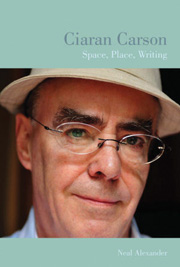Book contents
- Frontmatter
- Contents
- Acknowledgements
- Abbreviations
- Introduction
- Chapter 1 Imaginative Geographies: The Politics and Poetics of Space
- Chapter 2 Mapping Belfast: Urban Cartographies
- Chapter 3 Deviations from the Known Route: Reading, Writing, Walking
- Chapter 4 Revised Versions: Place and Memory
- Chapter 5 Spatial Stories: Narrative and Representation
- Chapter 6 Babel-babble: Language and Translation
- Bibliography
- General Index
- Index of Works
Chapter 6 - Babel-babble: Language and Translation
- Frontmatter
- Contents
- Acknowledgements
- Abbreviations
- Introduction
- Chapter 1 Imaginative Geographies: The Politics and Poetics of Space
- Chapter 2 Mapping Belfast: Urban Cartographies
- Chapter 3 Deviations from the Known Route: Reading, Writing, Walking
- Chapter 4 Revised Versions: Place and Memory
- Chapter 5 Spatial Stories: Narrative and Representation
- Chapter 6 Babel-babble: Language and Translation
- Bibliography
- General Index
- Index of Works
Summary
Translation is a longstanding and recurrent component of Ciaran Carson's work, not only as practice, process, and artefact – as his recent book-length versions of Dante's Inferno, Brian Merriman's The Midnight Court, and the Old Irish epic, The Táin, attest – but also as a theme or trope that relates to the multifarious effects of language itself. In this regard ‘translation’ concerns itself with the ways in which transactions between words, idioms, discourses, and languages reveal the difference that is internal to all language. Or, as Walter Benjamin expresses it, ‘all translation is only a somewhat provisional way of coming to terms with the foreignness of languages’. Translation also literally means to ‘carry across’, shuttling between differing contexts in order to negotiate meanings that are fundamentally unstable and in dialogue with other meanings, so that translation in this expanded sense is what poetry is all about, as Carson himself has suggested: ‘“Poetry is what gets lost in translation.” Perhaps; but poetry is itself translation, carrying a burden of meaning from one place to another, feeling it change in shape and weight as it travels. Words are a shifty business.’ Here, the notion that poetry is inimical to translation, often apocryphally ascribed to Robert Frost, is turned abruptly on its head, and Carson's more open conception of translation recognises that while words and languages are ‘shifty’, untrustworthy even, such ‘shiftiness’ means that they also encode multiple semantic possibilities.
- Type
- Chapter
- Information
- Ciaran CarsonSpace, Place, Writing, pp. 175 - 215Publisher: Liverpool University PressPrint publication year: 2010



